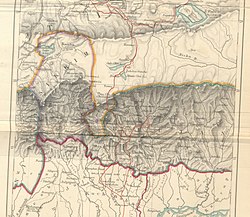Kingdom of Sikkim
| Kingdom of Sikkim | ||||||||
|
||||||||
|
||||||||
|
||||||||
|
Anthem Jahan Bagcha Teesta Rangeet where flows Teesta Rangeet |
||||||||
|
Historical map of Sikkim in northeastern India
|
||||||||
| Capital | ||||||||
| Languages | Sikkimese, Nepali | |||||||
| Religion | Mahayana Buddhism | |||||||
| Government | Monarchy | |||||||
| Chogyal | ||||||||
| • | 1642–1670 | Phuntsog Namgyal (first) | ||||||
| • | 1963–1975 | Palden Thondup Namgyal (last) | ||||||
| Legislature | State Council of Sikkim | |||||||
| History | ||||||||
| • | Established | 1642 | ||||||
| • | Treaty of Titalia signed | 1817 | ||||||
| • | Darjeeling gifted to British India | 1835 | ||||||
| • | Palden Thondup Namgyal forced to abdicate | 1975 | ||||||
| • | Merger with India | 16 May 1975 | ||||||
|
||||||||
| Today part of |
|
|||||||
The Kingdom of Sikkim was a hereditary monarchy from 1642 to 16 May 1975 in the Eastern Himalayas. It was ruled by Chogyal Kings.
In the mid-18th century, Sikkim was invaded by Nepal (then the Gorkha Kingdom) and was under the Gorkha rule for more than 25 years. Between 1785 and 1815, almost 100,000 ethnic Nepalis from Eastern and Central Nepal migrated to Sikkim and settled down after pledging allegiance to the Tibetan immigrant ruler, Chogyal. However, after the creation of India by the British, Sikkim allied itself with them as they had a common enemy – Nepal. The infuriated Nepalese attacked Sikkim with vengeance, overrunning most of the region including the Terai. This prompted the British East India Company to attack Nepal in 1814, resulting in the Anglo-Nepalese War. The Sugauli Treaty between Britain and Nepal and the Treaty of Titalia between Sikkim and British India resulted in Partition of Nepal with Nepal losing Sikkim in 1817.
Under the 1861 Treaty of Tumlong Sikkim became a British protectorate, then an Indian protectorate in 1950.
In 1975, allegations of discrimination against Nepali Hindus in Sikkim lead to resentment against the Chogyal. Their instigation led to Indian Army personnel moving in to Gangtok. According to Sunanda K. Datta-Ray of The Statesman the army killed the palace guards and surrounded the palace in April 1975.
After the annexation a referendum on the monarchy and Sikkim became a state of India.
...
Wikipedia



